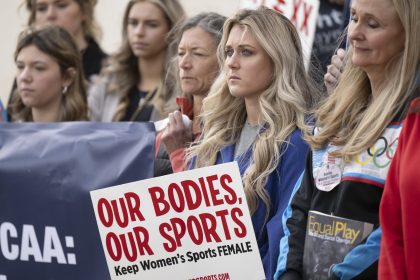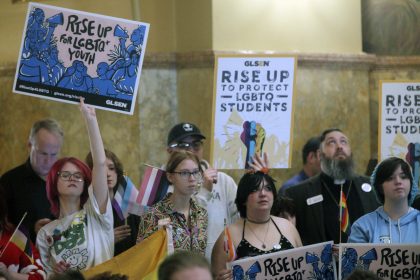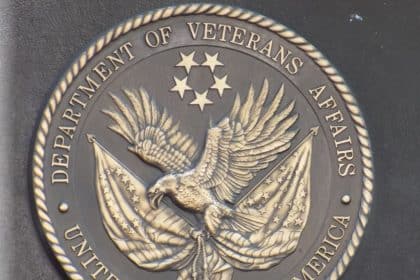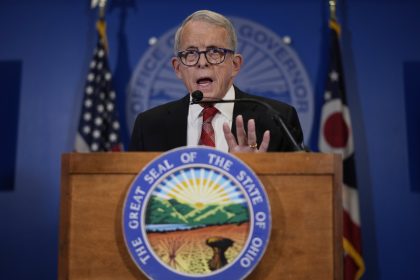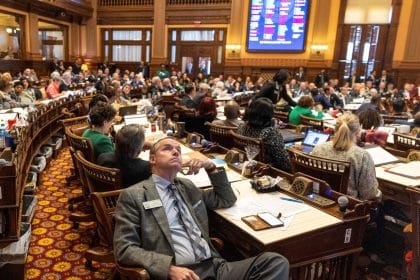Transgender Rights Advocates Shed Light on Trans Youth Experience

WASHINGTON — Following an unprecedented spike in anti-LGBTQ+ measures sweeping state houses this year, five transgender rights advocates gathered at a panel on Thursday afternoon to discuss the impact of anti-trans laws and rhetoric.
“It certainly feels like a state of emergency,” said Rose Montoya, a social media influencer and public speaker. “I constantly get messages from transgender youth, especially in states such as Florida, where there are so many attacks against trans and other LGBTQ+ peoples’ rights.”
This past Tuesday, the Human Rights Campaign, the nation’s largest LGBTQ+ civil rights organization, officially declared a state of emergency for LGBTQ+ people in the United States for the first time in the organization’s more than 40 years of history. This follows the Florida travel warning also issued by the HRC in partnership with Equality Florida, a state LGBTQ advocacy group.
“We knew it was a state of emergency a couple of years ago … We’ve known way before the broader cis-gay world knew that we were in a state of emergency,” said Devon Ojeda, a senior national organizer at the National Center for Transgender Equality.
“When I’m talking to my family, they don’t know that my community is dying. They don’t know that politicians are actively trying to eradicate us … We should all be disturbed by this, but the folks who seem to be the most disturbed and have been talking to each other about this have been trans people.”
Panelists also underscored the need for greater access to gender-affirming care, which refers to the medical, psychological and social support that validates and affirms the gender identity of individuals whose gender differs from their assigned sex at birth. It includes interventions like hormone therapy, surgeries, counseling and assistance with legal and social transitions.
“My concern is for trans youth,” said Montoya, citing the Trevor Project’s 2022 National Survey on LGBTQ Youth Mental Health, finding that 45% of LGBTQ youth seriously considered suicide in the past year. “I’ve heard so much fear-mongering around what hormone blockers do. What I think is really important to remind people is that every major medical association agrees that medically transitioning for children who do so is not only safe but life-saving.”
Prominent medical associations in the United States, including those specializing in pediatrics, endocrinology, psychiatry and psychology, have released statements acknowledging the medical necessity and suitability of gender-affirming care for young individuals. These statements often highlight the detrimental consequences of denying access to such services.
However, some states, including Alabama, Arkansas, Texas and Arizona, have recently enacted laws or policies restricting youth access to gender-affirming care and, in some cases, imposing penalties on adults facilitating access. The Biden administration has responded to these directives in a statement, denouncing them as discriminatory and noting that gender-affirming care for youth should be supported.
“There’s a lot of various medical gender-affirming care that is needed specifically at certain ages, and it’s all safe, it’s all reversible,” said Cal Dobbs, a queer transgender ultra-marathoner currently running across America to advocate for transgender rights.
“All we want is for trans youth to become trans adults,” said Rey Resendez, a 2Spirit model and content creator from La Paz, Bolivia. “The youth are basically our futures … We just want them to grow up, be the best adults they can be, and have the protections we lacked when we were growing up.”
“I’m not trying to create more trans youth; I just want to make sure that the youth that are trans, that are alive, stay alive as long as they can,” added Montoya.
At the conclusion of the event, panelists emphasized their pride in their transgender identities, underlining the importance of accurate media depictions of trans people.
“The truth about trans people is that we’re just people, and we’re just like you, and we’re not scary at all,” said Dobbs. “We care about our freedom to be ourselves, and we love who we love.”
You can reach us at [email protected] and follow us on Facebook and Twitter


















